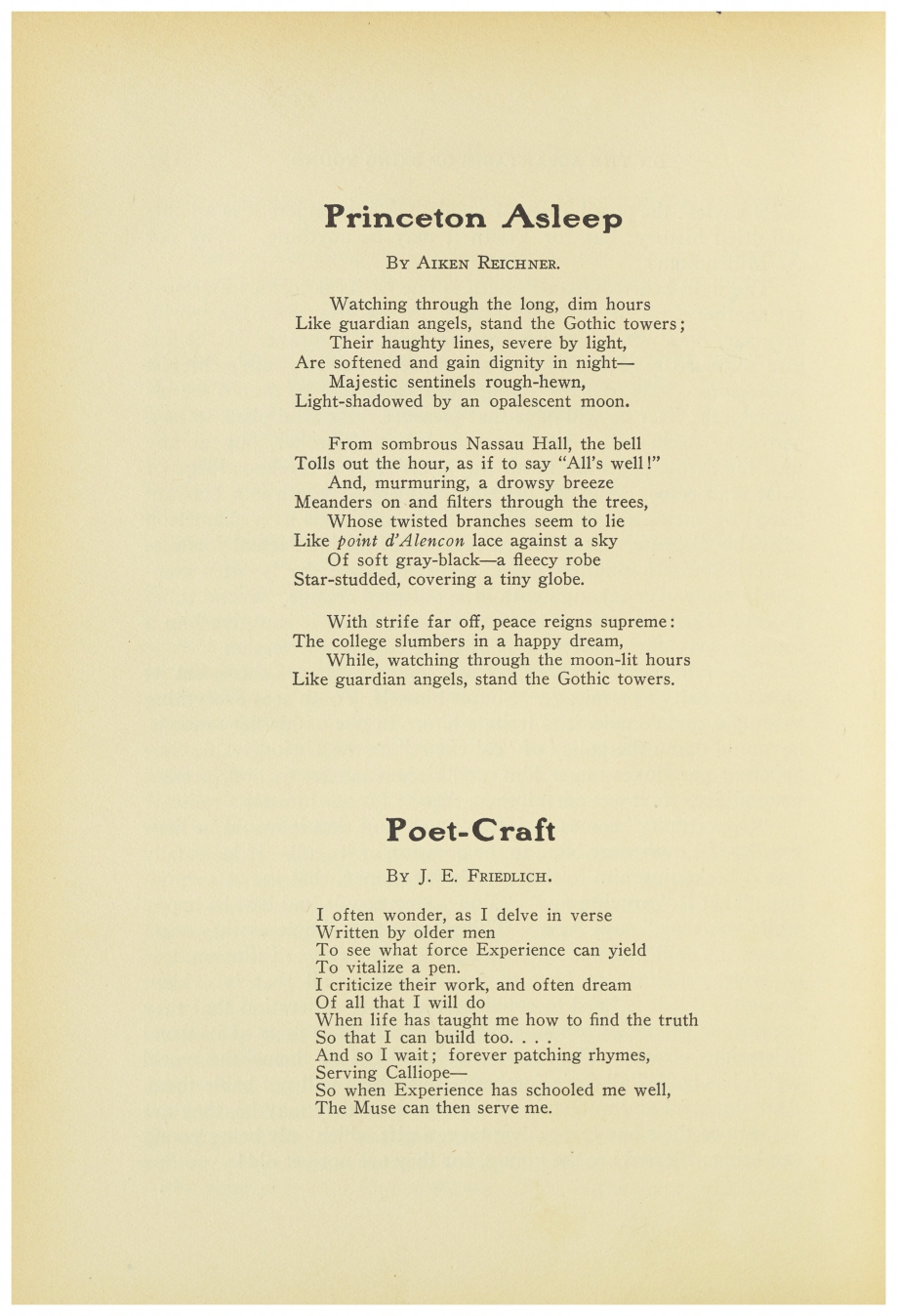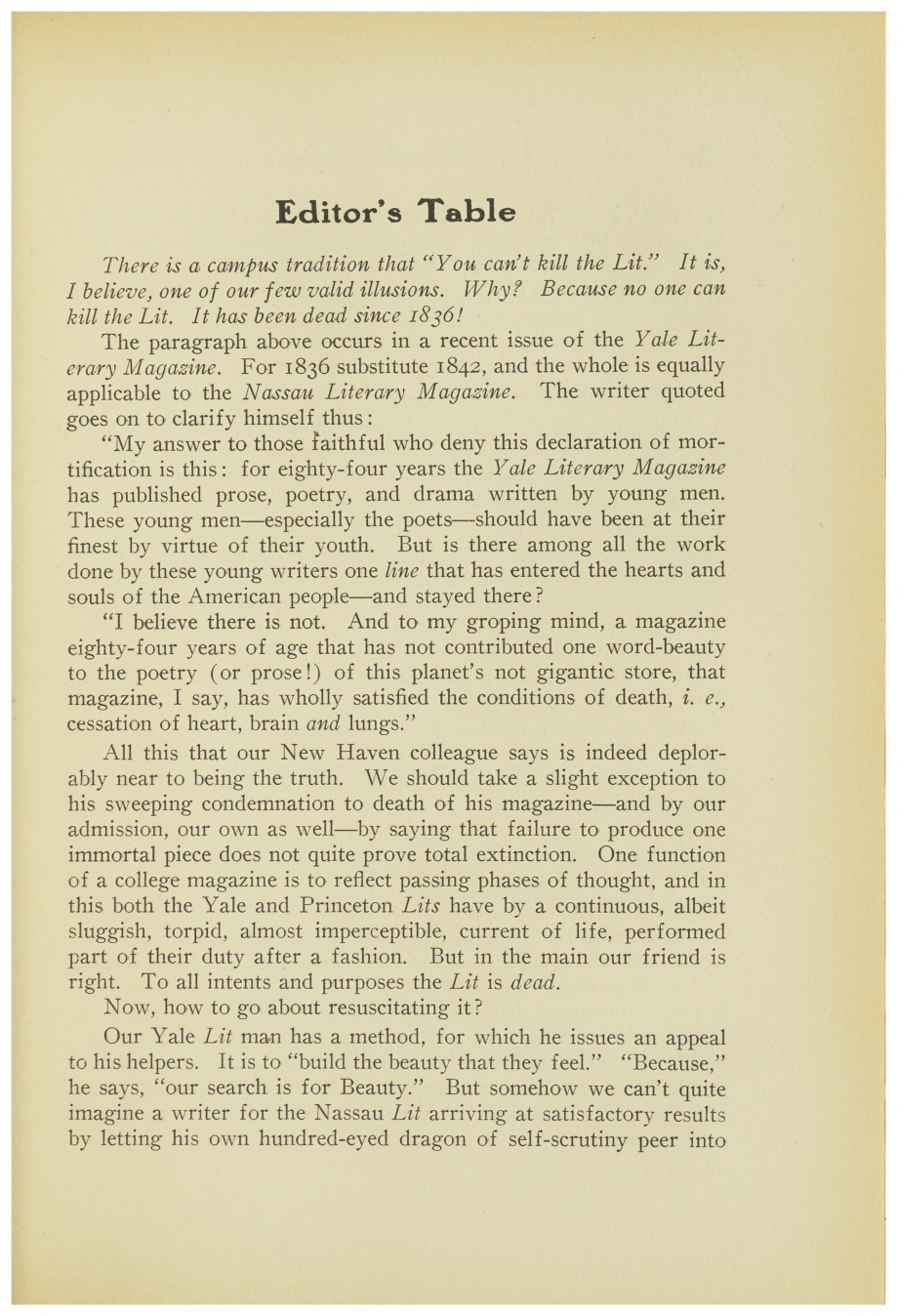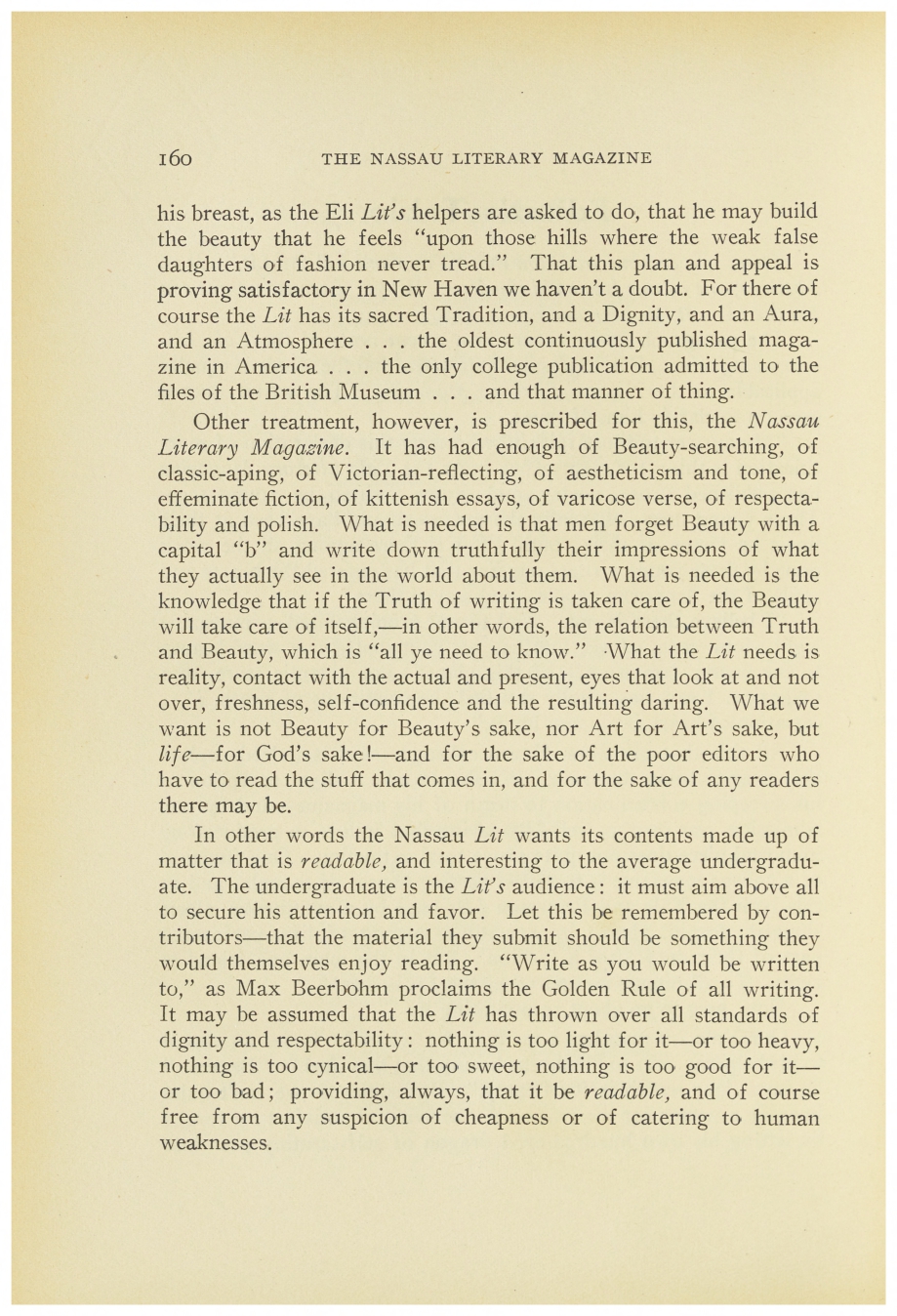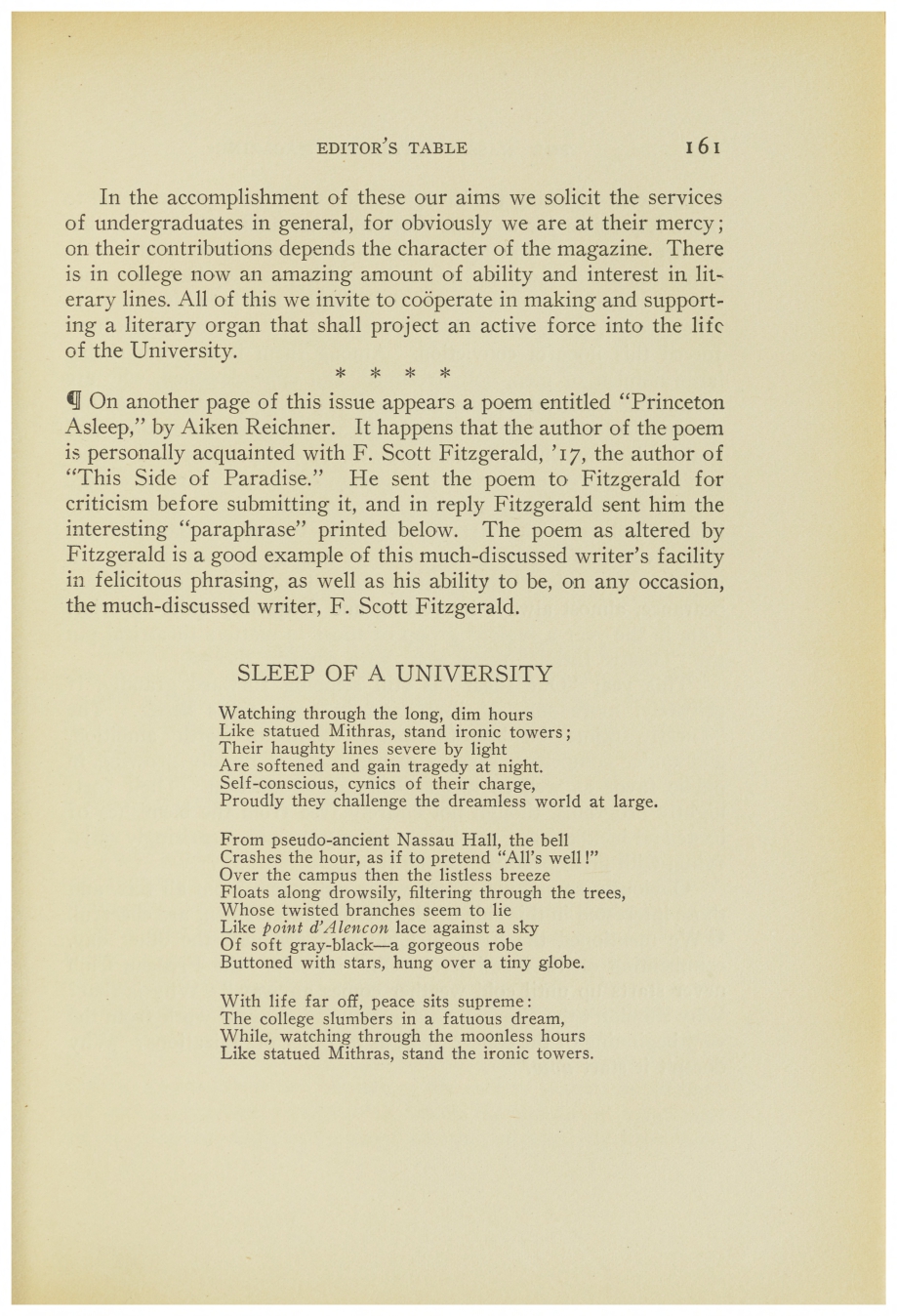
Sleep Of A University
by F. Scott Fitzgerald
Watching through the long, dim hours
Like statued Mithras, stand ironic towers;
Their haughty lines severe by light
Are softened and gain tragedy at night.
Self-conscious, cynics of their charge,
Proudly they challenge the dreamless world at large.
From pseudo-ancient Nassau Hall, the bell
Crashes the hour, as if to pretend “All's well!”
Over the campus then the listless breeze
Floats along drowsily, filtering through the trees,
Whose twisted branches seem to lie
Like point d'Alencon lace against the sky
Of soft gray-black—a gorgeous robe
Buttoned with stars, hung over a tiny globe.
With life far-off, peace sits supreme:
The college slumbers in a fatuous dream,
While, watching through the moonless hours
Like statued Mithras, stand the ironic towers.
Editor’s Table
There is a campus tradition that “You can’t kill the Lit.” It is, I believe, one of our few valid illusions. Why? Because no one can kill the Lit. It has been dead since 1836!
The paragraph above occurs in a recent issue of the Yale Literary Magazine. For 1836 substitute 1842, and the whole is equally applicable to the Nassau Literary Magazine. The writer quoted goes on to clarify himself thus:
“My answer to those faithful who deny this declaration of mortification is this: for eighty-four years the Yale Literary Magazine has published prose, poetry, and drama written by young men. These young men—especially the poets—should have been at their finest by virtue of their youth. But is there among all the work done by these young writers one line that has entered the hearts and souls of the American people—and stayed there?
“I believe there is not. And to my groping mind, a magazine eighty-four years of age that has not contributed one word-beauty to the poetry (or prose!) of this planet’s not gigantic store, that magazine, I say, has wholly satisfied the conditions of death, i. e., cessation of heart, brain and lungs.”
All this that our New Haven colleague says is indeed deplorably near to being the truth. We should take a slight exception to his sweeping condemnation to death of his magazine—and by our admission, our own as well—by saying that failure to produce one immortal piece does not quite prove total extinction. One function of a college magazine is to reflect passing phases of thought, and in this both the Yale and Princeton Lits have by a continuous, albeit sluggish, torpid, almost imperceptible, current of life, performed part of their duty after a fashion. But in the main our friend is right. To all intents and purposes the Lit is dead.
Now, how to go about resuscitating it?
Our Yale Lit man has a method, for which he issues an appeal to his helpers. It is to “build the beauty that they feel.” “Because,” he says, “our search is for Beauty.” But somehow we can’t quite imagine a writer for the Nassau Lit arriving at satisfactory results by letting his own hundred-eyed dragon of self-scrutiny peer into his breast, as the Eli Lit’s helpers are asked to do, that he may build the beauty that he feels “upon those hills where the weak false daughters of fashion never tread.” That this plan and appeal is proving satisfactory in New Haven we haven’t a doubt. For there of course the Lit has its sacred Tradition, and a Dignity, and an Aura, and an Atmosphere . . . the oldest continuously published magazine in America . . . the only college publication admitted to the files of the British Museum . . . and that manner of thing.
Other treatment, however, is prescribed for this, the Nassau Literary Magazine. It has had enough of Beauty-searching, of classic-aping, of Victorian-reflecting, of aestheticism and tone, of effeminate fiction, of kittenish essays, of varicose verse, of respectability and polish. What is needed is that men forget Beauty with a capital “b” and write down truthfully their impressions of what they actually see in the world about them. What is needed is the knowledge that if the Truth of writing is taken care of, the Beauty will take care of itself,—in other words, the relation between Truth and Beauty, which is “all ye need to know.” What the Lit needs is reality, contact with the actual and present, eyes that look at and not over, freshness, self-confidence and the resulting daring. What we want is not Beauty for Beauty’s sake, nor Art for Art’s sake, but life—for God’s sake!—and for the sake of the poor editors who have to read the stuff that comes in, and for the sake of any readers there may be.
In other words the Nassau Lit wants its contents made up of matter that is readable, and interesting to the average undergraduate. The undergraduate is the Lit’s audience: it must aim above all to secure his attention and favor. Let this be remembered by contributors—that the material they submit should be something they would themselves enjoy reading. “Write as you would be written to,” as Max Beerbohm proclaims the Golden Rule of all writing. It may be assumed that the Lit has thrown over all standards of dignity and respectability: nothing is too light for it—or too heavy, nothing is too cynical—or too sweet, nothing is too good for it— or too bad; providing, always, that it be readable, and of course free from any suspicion of cheapness or of catering to human weaknesses.
In the accomplishment of these our aims we solicit the services of undergraduates in general, for obviously we are at their mercy; on their contributions depends the character of the magazine. There is in college now an amazing amount of ability and interest in literary lines. All of this we invite to cooperate in making and supporting a literary organ that shall project an active force into the life of the University.
****
On another page of this issue appears a poem entitled “Princeton Asleep,” by Aiken Reichner. It happens that the author of the poem is personally acquainted with F. Scott Fitzgerald, ’17, the author of “This Side of Paradise.” He sent the poem to Fitzgerald for criticism before submitting it, and in reply Fitzgerald sent him the interesting “paraphrase” printed below. The poem as altered by Fitzgerald is a good example of this much-discussed writer’s facility in felicitous phrasing, as well as his ability to be, on any occasion, the much-discussed writer, F. Scott Fitzgerald.
Princeton Asleep, by Aiken Reichner
Watching through the long, dim hours
Like guardian angels, stand the Gothic towers;
Their haughty lines, severe by light,
Are softened and gain dignity in night—
Majestic sentinels rough-hewn,
Light-shadowed by an opalescent moon.
From sombrous Nassau Hall, the bell
Tolls out the hour, as if to say “All’s well!”
And, murmuring, a drowsy breeze
Meanders on and filters through the trees,
Whose twisted branches seem to lie
Like point d’Alencon lace against a sky
Of soft gray-black—a fleecy robe
Star-studded, covering a tiny globe.
With strife far off, peace reigns supreme:
The college slumbers in a happy dream,
While, watching through the moon-lit hours
Like guardian angels, stand the Gothic towers.
Published in Nassau Literary Magazine magazine (November 1920).
Not illustrated.



